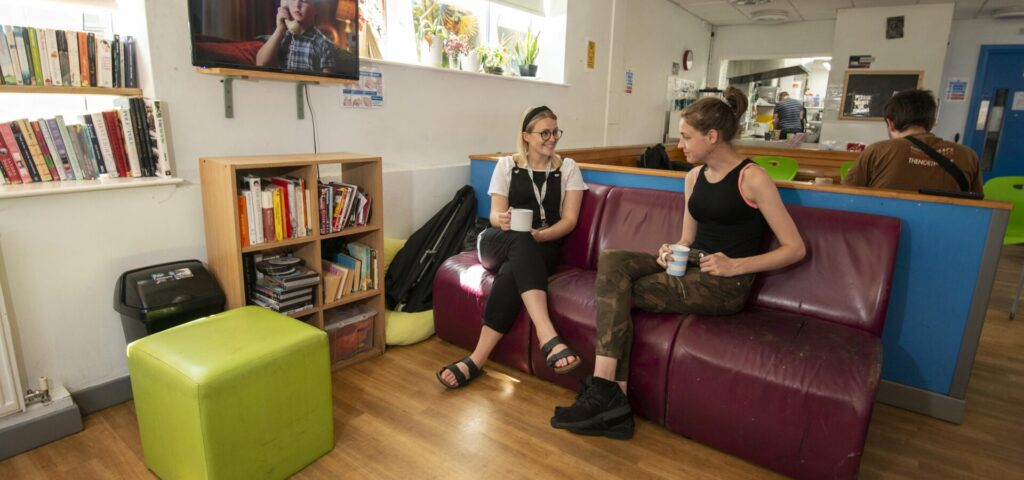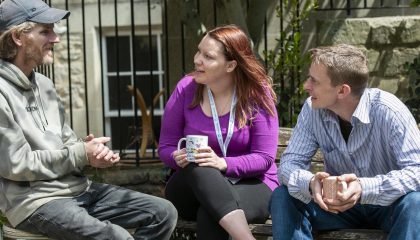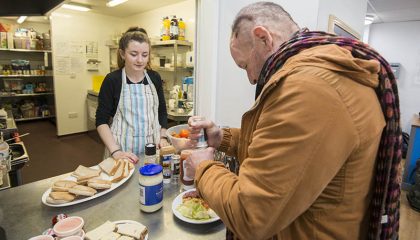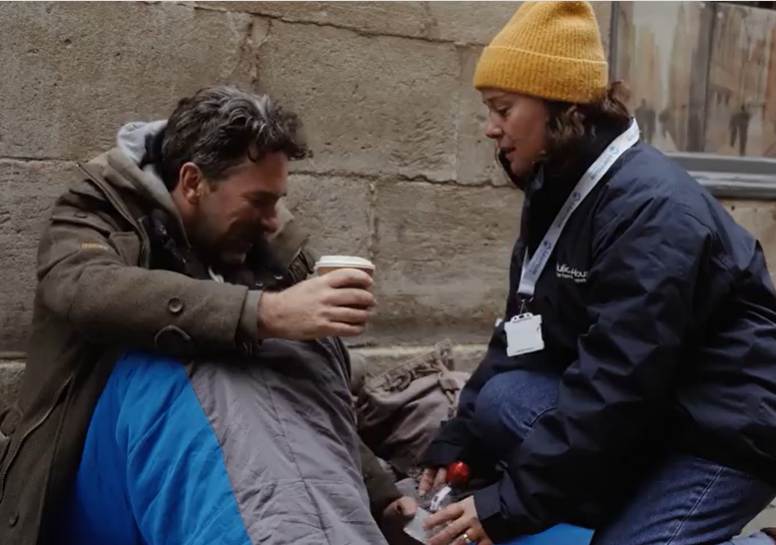
The Manvers Street is the organisation’s original project and has provided vital support to the 4,000 plus individuals who have passed through, over its 30-year history.
We had a chat with the Hostel’s Homeless Service Manager to find out a bit more about what the facility provides and why it is so vital to the clients that access it.
What does the Hostel provide?
It is a 20 bed direct access facility which is open 24 hours a day, 365 days a year. Direct access means anyone can seek help, there is no referral or other requirements that need to be met, before we will work with someone. The hostel provides accommodation for rough sleepers. Each client is allocated a ‘pod’ (sleeping space) and receives three meals a day.
If there are not enough pods and someone needs to access the hostel, an individual would be assessed by outreach and if any vulnerabilities that sleeping on the street would worsen, they would be granted ‘sit up’ (a camp bed in the day centre.)
There are washing and laundry facilities that anyone can assess and a homeless healthcare team is based in the hostel 9:30am-1:30pm Monday – Friday and consists of either a doctor or a nurse. The medical room is the same set-up as a GP surgery and the nurse/doctor can prescribe medication too. This is open to anyone who has this as their registered GP and so is often residents, outreach clients and even some Housing First and Supported Housing clients utilise this service too
A vets service also run a drop in once a month for anyone with pets. Again, this can be used for anyone in Julian House services who has a pet needing medical attention
Once we start working with a client, they are allocated a key-worker who will support the client to look for move on accommodation from the hostel. The key-worker will also support the client with other needs such as help with benefits, getting a bank account set up and accompanying them to meetings or appointments. During their stay, hostel support workers will help clients with any day to day needs they may have.
The Hostel also liaises with multiple agencies to provide holistic support to each resident, focusing on the core support needs specific to that individual
Why is it important to have this service for clients?
The hostel is a place with no judgement and helps people who feel like they have nowhere else to go or no one to turn to for help. The hostel is able to provide support for clients where other people may have rejected them. It’s a chance for clients to get back on their feet with the right tailored support they need – while also having their basic needs for shelter and food met.
Very often the Hostel is the first step on a journey away from a damaging and dangerous existence on the street.
What types of clients do you usually get at the hostel?
The only real requirement is that clients must be 18 or over. We have a wide variety of people all with a different backgrounds and experiences, there are no one size fits all solutions. We have some clients with substance misuse problems and others with mental health issues. Others have lost a job, been through a family breakdown or other trauma. Every client has their own individual story and circumstances.
What are the main challenges your clients are facing when they enter the hostel?
Engagement is a big challenge for a lot of our clients. They can often find trusting people very difficult. Because of this, building trust between staff and clients is a vital first step when it comes to working with them. Living in the hostel can also be difficult for some -as they face the challenge of living with other people from different backgrounds and with different, often complex needs. This can be really tricky for some.
Often they have lived very chaotic, traumatic and complex lives. This can have an effect on their behaviour and their priorities -meaning there can be difficulties encouraging them to engage.
How long do people usually stay for?
It varies on the client’s needs, their situation and their level of engagement. If a client engages with their weekly key-working sessions and their needs are seen as ‘low’ they could be here for as little as a month. Other clients may be here for six months or more, because they need more support than other clients.
There is also an additional challenge that there needs to be suitable accommodation for the individual to move on too. For many this is supported housing – as they will continue to need key working sessions and support to prepare them for their own tenancy. Others may move directly into a housing association or private rental property.
We aim to provide short term accommodation and hope for residents to move into more settled accommodation after within3 months.
What are some of the main reasons you see people more than once or for prolonged periods of time at the hostel.
Some clients we will see repeatedly as they view Julian house as a safe place to be, and they come back for the support we offer. Some clients may have moved on, but may have unfortunately relapsed due to one reason or another and need the support from the hostel. Other may have moved on but realised they were not ready for that stage in their life and may need to take a step back to get more support.






